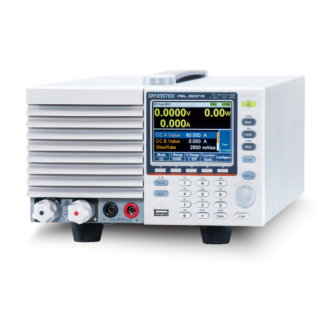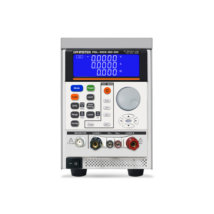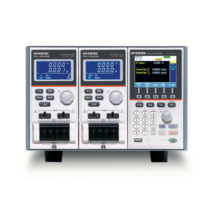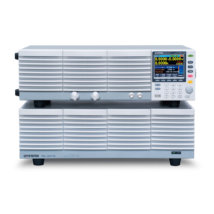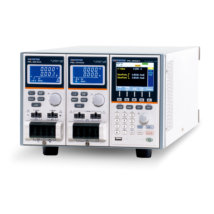| PEL-3031E | (150V / 60A/ 300W) programmable single-channel DC electronic load | |
| PEL-3032E | (500V/ 15A/ 300W) programmable single-channel DC electronic load |
PEL-3000E - Programmable D.C. Electronic Load
- 7 Operating Modes: CC, CV, CR, CP, CC+CV, CR+CV, CP+CV
- Fast/ Normal Sequence Function
- Soft Start
- Battery discharge test
- OCP、OPP test Automation
- Max. Slew Rate: 2.5A/us
- Dynamic mode
- Protection: OVP, OCP, OPP, OTP, RVP, UVP
- Remote Sense
- Integrate voltage, current and power measurement functions
- External Voltage or Resistance Control
- Rear Panel BNC、Trigger IN/OUT
- Analog External Control
- USB/GPIB(Optional)
GW Instek launches new PEL-3000E series programmable single-channel electronic load. In the series, PEL-3031E provides 300W (1V~150V/60A) and PEL-3032E provides 300W(2.5V~500V/15A) current sink capability. Inherited from the PEL-3000 series, PEL-3000E has an easy-to-read LCD panel and user-friendly interface. This model features high speed and accurate measurement capability for electronic component, battery, portable charger and power products that require low to medium power consumption.
The PEL-3000E series is designed for current sink operation starting from 60mA and aims at measurement applications, including charger, adapter, various power supply equipment, and portable charger.
The PEL-3000E has seven operating modes. Among them, four basic operating modes are constant current, constant voltage, constant resistance, and constant power. Three other combined operating modes are constant current + constant voltage, constant resistance + constant voltage, constant power + constant voltage. Users can select operating modes based upon products’ test requirements. For C.C. mode, electronic load will sink a constant current according to the set current value; for C.V. mode, electronic load will attempt to sink sufficient current to control the source voltage to the programmed value; for C.R. mode, electronic load will sink a current linearly proportional to input voltage according to the set resistance value; for C.P. mode, electronic load will initiate load power sinking operation (load voltage x load current)in accordance with the programmed power setting.
To meet the requirements of different test conditions, the Static function is to sink a constant current; the Dynamic function is to periodically switch between two sink conditions, and the Sequence function is to provide tests for more than two sink conditions. The sequence function can be divided into Normal Sequence and Fast Sequence. Normal Sequence is the most flexible mean of generating complex sequences that can facilitate users to establish a set of changing current sink conditions based upon different sinking conditions (CC, CR, CV or CP mode) and time(adjustable range: 1ms to 999h 59min 59s). Fast sequence allows time resolution of 25us to be set for the smallest step. Setting parameters for multiple steps can simulate consecutive current changes of various real load conditions. For instance, while using an electronic load to test a power-driven tool’s power supply, we can first obtain waveforms by an oscilloscope and a current probe from the tool, and subsequently, use the obtained waveforms to edit simulated current waveforms, via electronic load’s sequence function, to test the power-driven tool and to analyze its operational status. The Soft Start function allows users to determine the rise time of current sink that is to decide the required time to reach electronic load’s set current, resistance or power value. Setting a proper rise time for Soft Start is effective to counter output voltage fluctuation caused by DUT’s (power supply) transient output current. It is worth noting, General DC loads do not have the soft start function.
When conducting high speed current sink operation, the inductance effect on the cable connecting electronic load and DUT will lead to transient voltage drop on electronic load’s input terminal, therefore, that will result in Voltage Non-monotonic increase. PEL-3000E’s soft start function not only allows output voltage to be Monotonic increase, but also prevents inrush current and surge voltage from happening on DUT. For instance, tests using a power supply, LED and a DC load (activate the soft start function) can prevent inrush current and surge voltage from causing damages on LED.
The built-in BATT Test Automation of PEL-3000E provides battery discharge applications with more flexible discharge stop setting as well as rise and fall Slew Rate for discharge current settings. OCP, OPP test Automation for DUT (ex. Power Supply), provide users with high resolution measurement values to verify DUT’s activation point. Provide users with measurement results so as to help them determine whether DUT’s actual over protection activation point meets the regulations. Other than that, PEL-3000E provides users with analog control terminal to control PEL-3000E from external voltage, external resistance and switch. Analog control terminal can also monitor electronic load’s status and display protective alarms.

